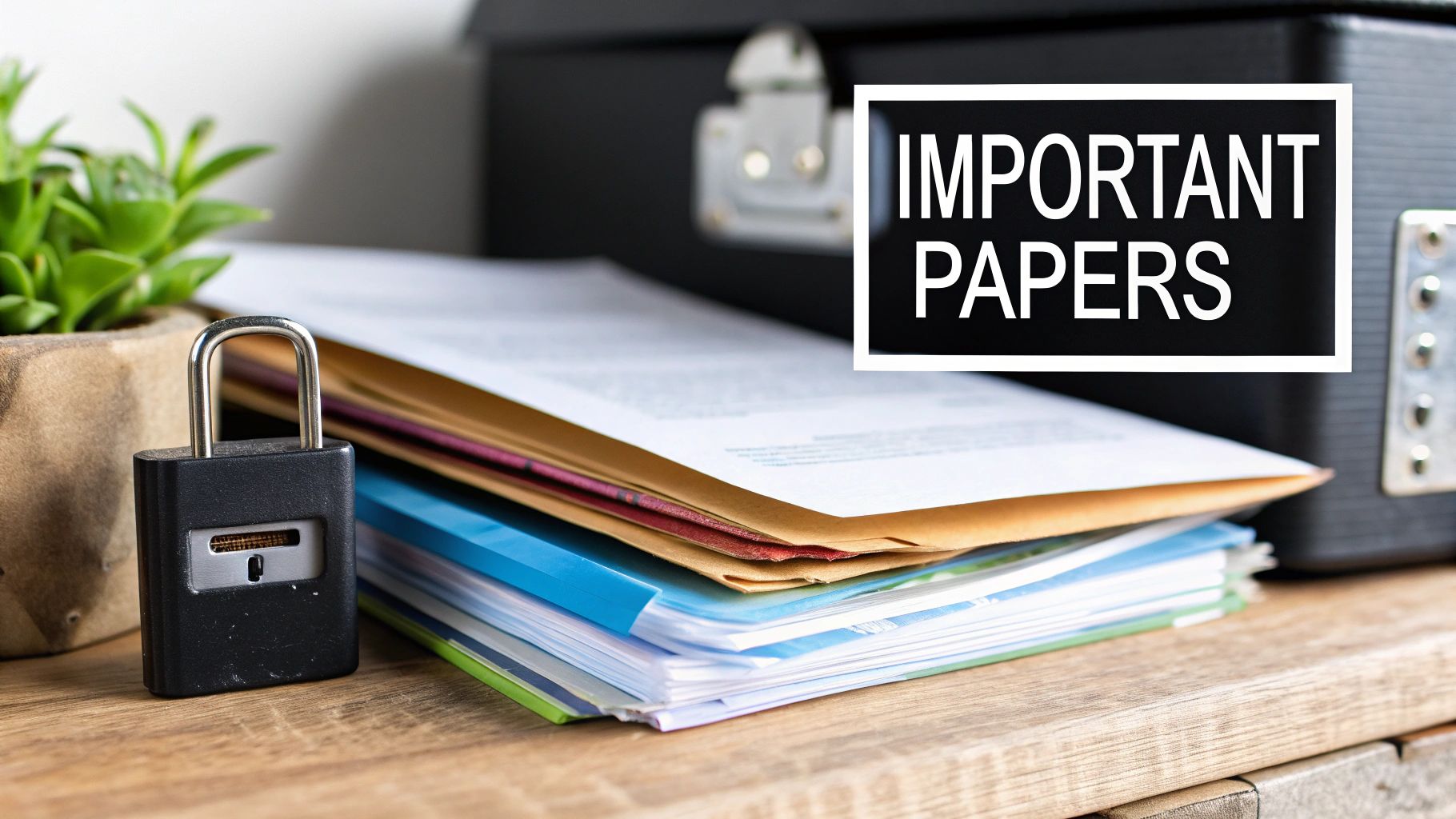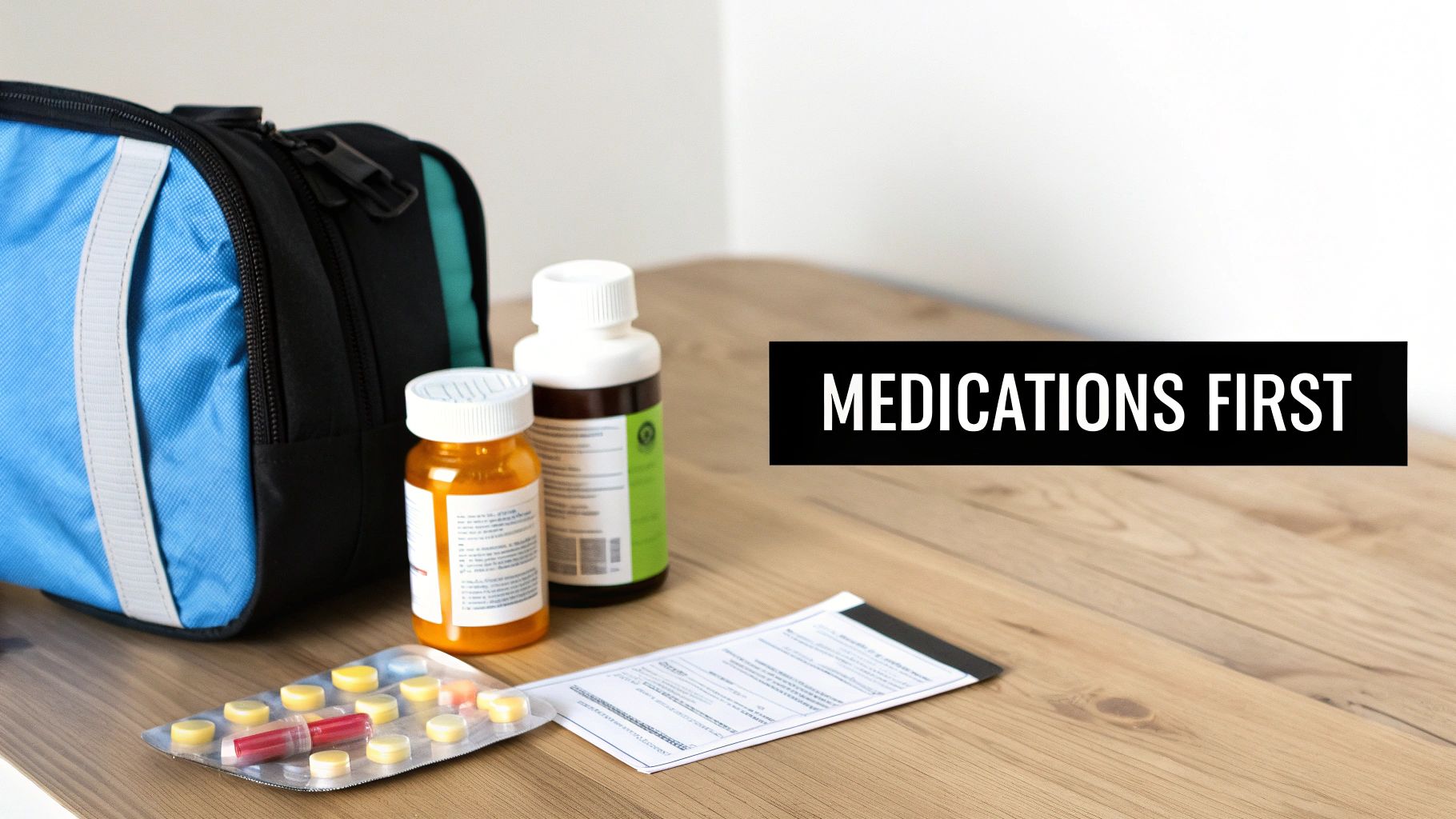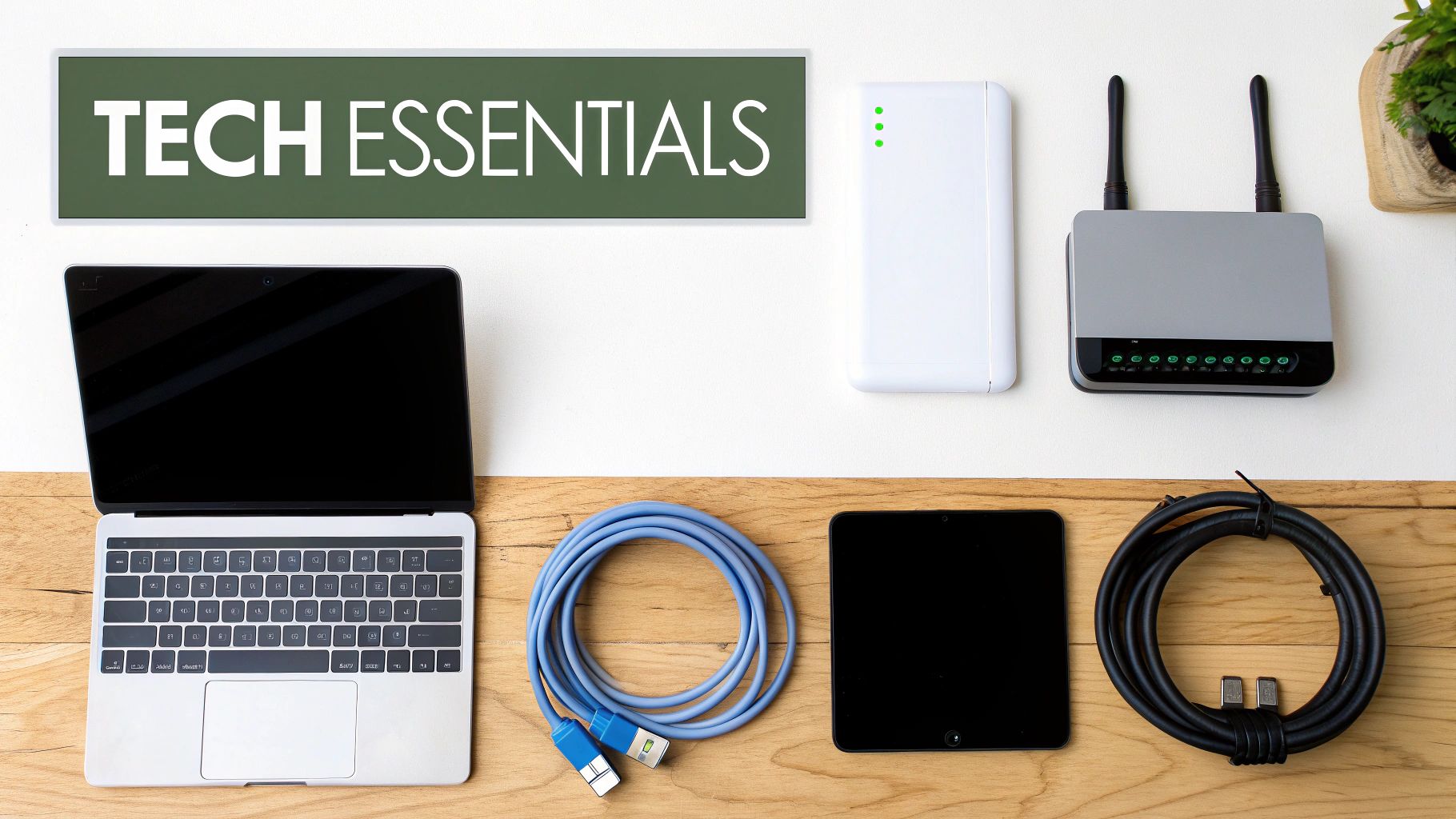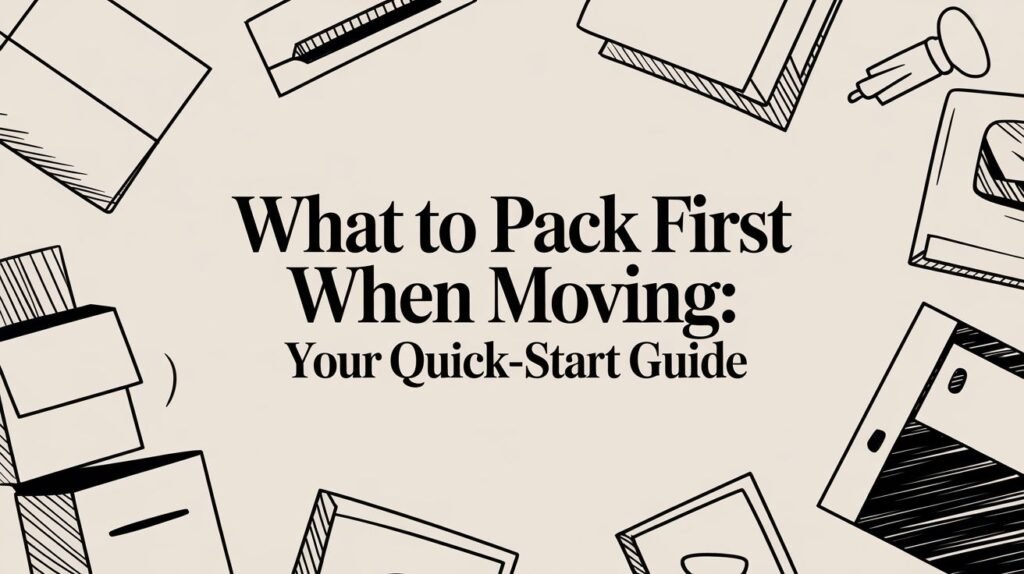Moving house is a monumental task, often feeling like a chaotic puzzle with a thousand pieces. The secret to a smooth, stress-free relocation isn't just about what you pack, but when you pack it. Knowing what to pack first when moving sets the tone for the entire process, transforming potential chaos into organised calm. This strategic approach ensures that you don't accidentally pack away your passport a month before you need it or find yourself searching for your child's favourite toy on moving day.
By prioritising the most critical items from the outset, you safeguard valuables, ensure immediate comfort in your new space, and maintain control from the first box sealed to the last one opened. This guide provides a clear, step-by-step plan detailing the seven categories of items you must tackle first. We'll explore not just the 'what,' but the crucial 'why' and 'how' for each category, providing actionable tips to protect your most important belongings. Following this order will streamline your move, whether you're relocating within Bristol, moving an office, or preparing items for long-term storage, ensuring a logical and efficient transition into your new home.
1. Important Documents & Personal Records
Before a single plate is wrapped or a piece of furniture dismantled, your first packing priority should be to secure all crucial personal and financial documents. These records are the administrative backbone of your life; they are often difficult, expensive, and time-consuming to replace. Deciding what to pack first when moving isn't just about convenience, it's about security. Packing these items at the very beginning ensures they are never lost in the chaos of boxes and packing paper, remaining safe and accessible from start to finish.

This category includes items that are fundamental to legal, financial, and medical transitions. Think of the paperwork needed for a property transaction in Bristol, which might require immediate access to title deeds or mortgage agreements on moving day itself. Similarly, registering with a new GP in Bath will be a far smoother process with your family's medical histories and NHS numbers readily available.
Why Pack Documents First?
The logic is simple: irreplaceability and immediate need. Unlike a misplaced kettle, which can be easily replaced, losing a passport or birth certificate can cause significant disruption. Professional organisations like The American Moving & Storage Association (AMSA) consistently recommend this approach to mitigate risk during a move. By isolating these documents early, you remove them from the general packing flow, preventing them from being accidentally sent to a storage unit or loaded onto the main removal van.
Actionable Tips for Securing Your Records:
To ensure your vital paperwork is managed effectively, follow these specific steps:
- Gather & Categorise: Collect all important documents in one place. Sort them into logical categories like Financial (bank statements, tax records), Legal (wills, deeds), Identification (passports, driving licences), and Medical (health records, insurance policies).
- Create a Digital Backup: Before packing the physical copies, scan or take clear photographs of each document. Store these digital copies in a secure, encrypted cloud service like Google Drive or Dropbox. This provides a crucial backup in a worst-case scenario.
- Use a Dedicated Carrier: Invest in a durable, waterproof, and preferably fire-resistant document bag or small lockbox. This container should be exclusively for these items.
- Keep Them With You: Never pack important documents with your household goods. This container must travel with you personally in your own vehicle, not in the removal van. This guarantees you have constant control and access.
2. Essential Medications & Health Supplies
Immediately after securing your documents, your next priority must be essential medications and critical health supplies. These items are non-negotiable for maintaining your wellbeing during the transition period. Deciding what to pack first when moving involves prioritising health and safety above all else, and ensuring uninterrupted access to necessary treatments is paramount. Packing these supplies early guarantees they are not misplaced or made inaccessible during the often-unpredictable timeline of a move.

This category includes prescription medications, over-the-counter remedies like pain relievers, vitamins, and first-aid items. Consider a family with a young child who needs an asthma inhaler or an individual managing diabetes who requires insulin and testing kits. Forgetting these items in a packed-up removal van could turn a stressful day into a medical emergency. Having them separate and accessible provides peace of mind and ensures continuity of care.
Why Pack Medications First?
The reasoning is clear: immediate need and health criticality. While you can buy a new toothbrush easily, obtaining an emergency prescription refill, especially in a new city like Bristol or Bath, can be complicated and stressful. Healthcare organisations like the American Pharmacists Association strongly advise that patients manage their medication plans well in advance of a move. By segregating these vital supplies from the start, you protect yourself and your family from potential health crises and avoid the frantic search through countless boxes for a single, crucial item.
Actionable Tips for Securing Your Health Supplies:
To manage your medications and health items safely during a move, follow these practical steps:
- Gather & Assess: Collect all prescription and over-the-counter medicines for every family member. Check expiry dates and ensure you have enough to last through the moving period plus an extra week.
- Use a Dedicated Bag: Pack everything into a small, insulated cool bag or a clearly labelled box. For temperature-sensitive medications like insulin, include a cold pack.
- Keep Original Packaging: Store all medicines in their original, labelled containers. This avoids confusion and provides essential dosage information and pharmacist details if needed.
- Keep Them With You: This is the most important rule. Never place medications in a box destined for the removal van or a storage unit. This bag must travel with you in your personal vehicle to ensure you have constant access.
- Plan Ahead: Speak to your GP about getting prescription refills in advance. Research and register with a new pharmacy or GP surgery near your new home before you move.
3. Items for First Night & Essentials Box
After securing your vital documents, the next priority is to prepare for the immediate aftermath of the move: your first 24 hours in the new property. This is where an 'Essentials Box' becomes your most valuable asset. This isn't just another box; it’s a carefully curated survival kit designed to prevent a frantic search for basic necessities after an exhausting day of lifting and shifting. Deciding what to pack first when moving involves planning for comfort and convenience, and this box is the key to a stress-free first night.
This concept is widely championed by professional moving companies and home organisation experts alike. Imagine arriving at your new Bristol flat late in the evening, only to realise the kettle, phone chargers, and toilet roll are buried in one of fifty identical brown boxes. An essentials box ensures that everything from a cup of tea to your toothbrush is immediately at hand, turning a potentially chaotic evening into a comfortable transition.
Why Pack an Essentials Box First?
The logic is rooted in immediate access and stress reduction. While other items can wait to be unpacked over days or weeks, the contents of this box are needed within hours of your arrival. It separates the critical from the non-essential, allowing you to focus on settling in rather than hunting for necessities. Home organisation guru Marie Kondo advocates for similar principles of categorising and prioritising items that serve an immediate and important function. By packing this box early in the process, you can methodically add items as you think of them, ensuring nothing crucial is forgotten.
Actionable Tips for Your Essentials Box:
To create a truly effective first-night kit, follow these specific steps:
- Select & Label: Choose a distinct container, like a large, brightly coloured plastic tub or a clearly marked box. Label it on all sides with "OPEN FIRST" or "ESSENTIALS" in bold lettering.
- Categorise the Contents: Group items by room to make them easier to find. Include a small bag of toiletries for each family member, basic kitchen supplies (kettle, mugs, tea bags, instant coffee, a can opener, paper plates), and essential cleaning products (toilet roll, hand soap, multipurpose spray, bin bags). You can find more ideas in a comprehensive moving house checklist.
- Add Comfort & Practicality: Pack a change of comfortable clothes and pyjamas for everyone. Don’t forget crucial electronics like phone chargers, a portable speaker, and a torch with fresh batteries. A basic toolkit with a screwdriver and Allen keys is also invaluable.
- Keep It With You: Just like your important documents, this box should travel in your personal vehicle, not on the removal van. This guarantees it arrives with you and is instantly accessible the moment you walk through the door.
4. Electronics & Technology Equipment
In our digitally driven world, electronics are no longer just luxuries; they are essential tools for work, communication, and entertainment. Packing computers, routers, TVs, and other devices early is a critical step. These items are often valuable, fragile, and needed almost immediately upon arrival at your new home. Deciding what to pack first when moving should prioritise these sensitive items, allowing you ample time to disconnect, organise, and protect them properly before the main packing rush begins.

This category is especially crucial for the increasing number of people working remotely. A remote worker moving to a new flat in Bristol needs their full office setup, including monitors and router, to be functional on day one to avoid professional disruption. Likewise, a family moving house will want their Wi-Fi and television connected quickly to restore a sense of normality and keep children entertained amidst the unpacking chaos.
Why Pack Electronics First?
The core reasons are fragility and immediate utility. Unlike sturdy items like books, electronics are highly susceptible to damage from impact, static electricity, and temperature fluctuations. Tech experts and IT professionals always advise careful, early packing to minimise these risks. Packing them first isolates them from the general chaos, ensuring they receive the specialised attention they require and aren't hastily thrown into a box at the last minute.
Actionable Tips for Securing Your Tech:
To ensure your valuable electronics arrive safely and are easy to set up, follow these specific steps:
- Document & Disconnect: Before unplugging anything, take clear photos of the cable configurations on the back of your TV, computer, and router. This visual guide will make reassembly incredibly straightforward.
- Backup Your Data: Perform a full backup of all computers and laptops to an external hard drive or a secure cloud service. This is a non-negotiable step to protect against data loss.
- Label Everything: Use cable ties and colour-coded labels for all cords. Clearly label each box with its contents and the room it belongs to (e.g., "Living Room TV & Sky Box").
- Use Proper Protection: If you still have the original packaging, use it. If not, use anti-static bubble wrap and sturdy boxes. Our guide to professional removal packaging in Bristol offers further insight into the best materials to use.
- Keep Them With You: If possible, transport sensitive and valuable items like laptops and tablets in your personal vehicle to protect them from extreme temperatures and potential damage in the removal van.
5. Valuables & Irreplaceable Items
Alongside your vital documents, your next priority involves securing items whose value isn't just financial, but deeply personal. Valuables and irreplaceable heirlooms, from grandmother's jewellery to a prized art collection, carry significant sentimental weight. Deciding what to pack first when moving must account for these emotionally charged items. Packing them early ensures they receive the care and attention they deserve, keeping them safe from the hurried last-minute rush and potential damage.
This category covers anything that, if lost or broken, could not be replaced. Consider the careful planning required to move a collection of fragile Bristol Blue Glass or the emotional distress of misplacing inherited military medals. These items represent family history, personal achievements, and significant memories that transcend monetary value, making their protection a critical first step.
Why Pack Valuables First?
The core reason is a combination of risk mitigation and emotional peace of mind. These items are often fragile, uniquely shaped, or small enough to be easily misplaced. By packing them first, you can dedicate focused time to wrapping them correctly and creating a detailed inventory. Fine art moving specialists and insurance companies universally advise this approach to minimise the risk of loss, theft, or damage during the move's most chaotic phases.
Actionable Tips for Securing Your Valuables:
To ensure your most cherished possessions are handled with the utmost care, follow these specific steps:
- Inventory and Appraise: Before packing, create a detailed inventory list with clear photographs of each item. For high-value pieces like artwork or antiques, obtain a current professional appraisal. This documentation is essential for insurance purposes.
- Use Specialised Packing: Do not use standard boxes. Invest in specialised materials like padded jewellery cases, multi-layered art crates, or acid-free tissue paper for delicate fabrics and photos. Wrap each item individually.
- Keep Them With You: Just like important documents, never pack valuables in the main removal van. Transport them personally in your own vehicle. For larger items, this may not be feasible, but for jewellery, collectibles, and small heirlooms, it's non-negotiable.
- Consider Secure Storage: If there's a gap between moving out and moving in, or if you need to declutter, placing valuables in a secure, climate-controlled unit is a wise choice. Renting storage in Bristol requires careful consideration to ensure your items are protected.
6. Pet Supplies & Comfort Items
For pet owners, the well-being of their furry, feathered, or scaled family members is a top priority during a move. Just as you secure your own vital records, packing your pet's supplies and comfort items early is crucial for their health and emotional stability. Deciding what to pack first when moving involves considering the needs of every family member, and pets are particularly sensitive to the disruption and stress of relocation. Setting aside their essentials at the beginning ensures they have everything they need to feel secure throughout the entire process.
This category covers everything from daily necessities like food and medication to items that provide a sense of normalcy, such as their favourite bed, toys, and grooming tools. Moving from a familiar home in Bristol to a new one can be confusing for an animal. Having their familiar-smelling blanket and usual food bowl ready on day one in Bath can significantly ease their anxiety and help them settle into the new environment more quickly.
Why Pack Pet Supplies First?
The core reason is continuity of care and stress reduction. Animals thrive on routine, and a move is the ultimate disruption to that routine. Unlike humans, they don't understand what's happening. The American Veterinary Medical Association highlights that maintaining familiar schedules and objects is key to a successful transition. By packing their supplies first into a dedicated, easily accessible box, you guarantee their needs won't be overlooked in the moving day chaos, preventing unnecessary stress or health issues.
Actionable Tips for Securing Your Pet's Essentials:
To manage your pet's needs effectively during the move, follow these specific steps:
- Create a Pet Essentials Box: Pack a clearly labelled box or bag with several days' worth of food, water, bowls, medication, poo bags, and litter trays. This should be the last thing loaded and the first thing unloaded.
- Keep Comfort Items Close: Don't pack away their favourite toy or bed in a large, unlabelled box. Keep these items with your pet during the journey and make them immediately available in your new home.
- Update Records & ID: Ensure your pet's microchip details are updated with your new address before you move. Keep a copy of their veterinary records with your other important documents. For those planning a significant move across borders, understanding specific requirements for pets is crucial. Explore detailed International Pet Travel Guidelines to ensure a smooth transition.
- Plan for Moving Day: Arrange for your pet to stay with a friend, family member, or at a kennel on the busiest day to keep them safe. If they must be present, transport them in your personal vehicle inside a secure, well-ventilated carrier, never in the removal van.
7. Kitchen Essentials & Basic Cookware
While many advise packing the kitchen last, tackling a core set of kitchen essentials early is a strategic move. By separating daily-use items from the less-used gadgets and formal dinnerware, you streamline the final, frantic days of packing. Deciding what to pack first when moving involves prioritising function over sentiment, and a well-organised kitchen pack-out prevents you from resorting to costly takeaways for days on end and allows your family to settle in faster.
This category includes the bare minimum needed for simple meal preparation and eating. Consider what you’d need to make a pasta dish or toast for breakfast in your new Bristol flat: a single pot, a frying pan, a few plates, and cutlery. This approach, recommended by home organisation experts, ensures you can maintain a sense of normality and manage your budget during the transitional period.
Why Pack a Core Kitchen Set Early?
The principle here is continuity and practicality. Packing away the entirety of your kitchen leaves you without basic facilities. By curating an "essentials" box early, you define what stays out for use until the last day. This box then becomes one of the last to be loaded and the first to be opened at your new home, ensuring you can make a cup of tea or a simple meal immediately upon arrival without rummaging through dozens of fragile boxes.
Actionable Tips for Packing Kitchen Essentials:
To manage your kitchen packing efficiently, follow these targeted steps:
- Define Your Essentials: Before packing, identify a small set of cookware: one saucepan, one frying pan, a chopping board, a sharp knife, and a few utensils. Add one plate, bowl, mug, and set of cutlery per family member. For a comprehensive overview of what basics you'll need, a first apartment kitchen essentials checklist can be an invaluable guide.
- Use Proper Materials: Use strong, double-walled boxes, often called dish packs, for fragile items. Wrap each plate and bowl individually in packing paper, stacking them vertically to minimise pressure.
- Pack Smartly & Label Clearly: Place the heaviest items, like your saucepan, at the bottom of the box. Fill empty spaces with tea towels or bubble wrap to prevent shifting. Label the box clearly with "KITCHEN ESSENTIALS," "FRAGILE," and "OPEN FIRST."
- Keep It Separate: This essential kitchen box should travel with you or be loaded last on the removal van for immediate access. This ensures you're not left searching for a coffee mug on your first morning in your new home.
7-Item Priority Packing Comparison
| Item | Implementation Complexity 🔄 | Resource Requirements ⚡ | Expected Outcomes 📊 | Ideal Use Cases 💡 | Key Advantages ⭐ |
|---|---|---|---|---|---|
| Important Documents & Personal Records | Low 🔄 — requires careful organization and labeling | Low ⚡ — lockbox, folders, cloud backup | High 📊 — immediate access to legal/financial records | Moving, legal/financial transactions, settling in | ⭐ Irreplaceable protection; speeds admin tasks |
| Essential Medications & Health Supplies | Moderate 🔄 — temperature control and strict labeling | Moderate ⚡ — medicine bag, cooling packs, prescriptions | High 📊 — continuity of care; prevents medical gaps | Chronic conditions, moving day, travel | ⭐ Ensures health continuity; reduces emergency risk |
| Items for First Night & Essentials Box | Low–Moderate 🔄 — create and follow a checklist | Low ⚡ — bin, toiletries, bedding, chargers, basic tools | High 📊 — immediate comfort; avoids frantic searching | Any move, dorm/destination arrivals, temporary housing | ⭐ Immediate usability; lowers first-night stress |
| Electronics & Technology Equipment | High 🔄 — anti-static packing, labeling, backups | High ⚡ — original boxes, anti-static wrap, backup drives | High 📊 — quick setup; preserves data and function | Remote workers, home office moves, tech setups | ⭐ Protects costly gear; enables fast restart |
| Valuables & Irreplaceable Items | High 🔄 — specialized packing, inventory, appraisals | Moderate–High ⚡ — safes, padded boxes, insurance | High 📊 — loss prevention; clear insurance documentation | Art/antique moves, estate relocations, collectors | ⭐ Preserves financial & sentimental value |
| Pet Supplies & Comfort Items | Moderate 🔄 — coordination, separate transport planning | Moderate ⚡ — carriers, food, records, bedding, meds | High 📊 — reduced animal stress; safe transport | Pet owners, long-distance moves, relocations with pets | ⭐ Maintains pet health and eases adjustment |
| Kitchen Essentials & Basic Cookware | Moderate 🔄 — careful wrapping and strategic packing | Moderate ⚡ — dish packs, padding, one-set essentials | High 📊 — enables meal prep; reduces eating-out costs | Families, short-term stays, first week after move | ⭐ Restores routine quickly; cost-effective meals |
Making Your Move Seamless from Start to Finish
Navigating a move successfully hinges on a clear, strategic packing plan. As we've explored, the process isn't just about getting everything into boxes; it’s about prioritising with precision. By systematically tackling your belongings in the right order, you transform a potentially chaotic experience into a controlled and streamlined project.
Key Takeaways for a Stress-Free Pack
The core principle is simple: pack what you use least, first. This means that out-of-season clothes, decorative items, books, and non-essential kitchen gadgets should be your initial targets. This strategy progressively clears space and builds momentum without disrupting your daily life.
Conversely, the items you rely on every day should be the absolute last things to be packed. This category includes your essential documents, daily medications, and, crucially, the contents of your 'first-night' box. Understanding what to pack first when moving is fundamentally about creating a logical timeline that protects your most vital possessions and ensures immediate comfort upon arrival at your new home.
Key Insight: A well-organised move is a puzzle solved in reverse. You start with the pieces you'll need last and finish with the essentials you'll need first, ensuring they are always within easy reach.
From Plan to Action: Your Next Steps
Your moving journey begins not with a box, but with a checklist. Review the categories we've discussed:
- Secure the Vitals: Important documents, medications, and irreplaceable valuables should be packed separately and kept with you personally.
- Prepare for Arrival: Your essentials box is your lifeline for the first 24 hours. Pack it with toiletries, a change of clothes, basic tools, and snacks.
- Systematic Decluttering: As you pack non-essential items weeks in advance, use it as an opportunity to declutter. Donate, sell, or dispose of anything you no longer need. This reduces packing volume and moving costs.
Embracing this methodical approach does more than just organise your belongings; it provides peace of mind. Knowing your passports are safe, your pet has their favourite toy, and you can make a cup of tea the moment you walk through your new door is invaluable. You are not just moving house; you are orchestrating a smooth transition into the next chapter of your life. With a solid plan, you can focus on the excitement of settling in, rather than the stress of moving out.
Ready to make your move even smoother? For expert packing services, high-quality materials, and secure storage solutions in the Bristol and Bath area, contact SimplyPro Removal & Storage Ltd. Let our professional team handle the logistics of packing, so you can focus on your new beginning.


